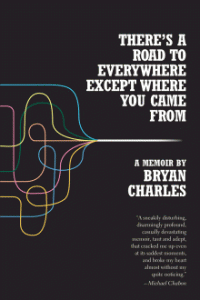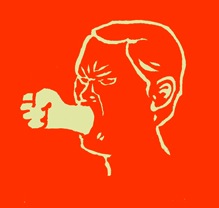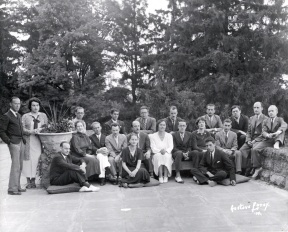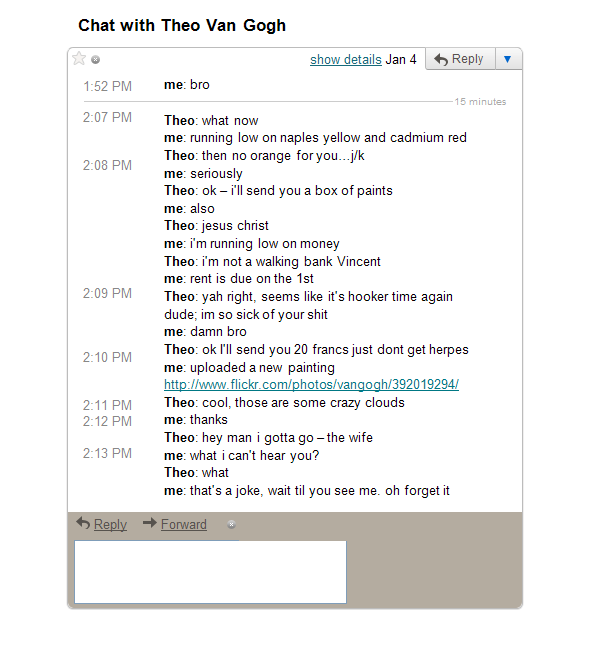Interview: Bryan Charles
 I read Bryan Charles’s memoir, There’s a Road to Everywhere Except Where You Came From, in that non-stop way that feels like your life depends on it. (A few months ago, Justin ran an excerpt of it.) It was a little funny, a little lonely and a little unsettling, but when one chapter ended I moved on to the next as it I was starved for it. Maybe this is the definition of a compelling voice, one that just makes you listen even when you don’t know why. A friend who had also read There’s a Road, as well as Charles’s novel described him as a particularly earnest writer, and I have to agree, so maybe that’s another reason I read so intently—an earnest voice among shelves and shelves of ironic ones. This interview was conducted over email.
I read Bryan Charles’s memoir, There’s a Road to Everywhere Except Where You Came From, in that non-stop way that feels like your life depends on it. (A few months ago, Justin ran an excerpt of it.) It was a little funny, a little lonely and a little unsettling, but when one chapter ended I moved on to the next as it I was starved for it. Maybe this is the definition of a compelling voice, one that just makes you listen even when you don’t know why. A friend who had also read There’s a Road, as well as Charles’s novel described him as a particularly earnest writer, and I have to agree, so maybe that’s another reason I read so intently—an earnest voice among shelves and shelves of ironic ones. This interview was conducted over email.
Catherine Lacey: This was a weird book to me. I can’t seem to get comfortable with it. It’s been sitting on my desk for a few weeks and sometimes I consider moving it or hiding it, like we’re having a fight or something. A friend told me he thought of your writing as incredibly earnest, and I’ll add brave and unpretentious to that, but there’s also something really emotionally unavailable about the book, which is odd since it’s a memoir. Do you think of it the same way? How did you feel while writing it?
Bryan Charles: The memoir was begun at a point of frustration. I’ve talked about this elsewhere, but I had initially tried to use some of the same material—mostly the 9/11 stuff—in a novel. Once I realized I could actually write a novel, which only occurred to me after I finished my first one, I knew I would use my experience working in the World Trade Center, the attack, and the aftermath in a book in some way. At that time some of the so-called 9/11 novels had come out, or were scheduled to come out, and I felt, rightly or wrongly, that these books, written by people with no direct connection to the attack—except for maybe being in in the city that day—were totally without merit. I was incredibly territorial about it, probably to a fault. I tried to keep a slightly open mind. I read one of those books, the Jonathan Safran Foer book, and I thought it was terrible and should never have been published. It’s an awful, inexcusable novel. I still think whoever was responsible—whichever editor or publisher—for keeping that flipbook thing at the end, with the 9/11 jumper falling upward—whoever let that slide should be fired. Maybe they have been already. READ MORE >
The Pleasures of Cheever
Some of you might very frequently pick up a book feeling certain that you will like it. This happens to me pretty rarely; usually only when I’ve read the book already, or when it is by Charles Dickens or Virginia Woolf. So it was with particular relish when, still feeling the pang of having no more of Middlemarch to read, I opened The Wapshot Chronicle by John Cheever.
I’d only read Cheever’s stories, which I really love, whether the earlier perhaps more conventional ones or later so-called experiments like “The Swimmer.” Putting aside the question of whether “experimental” is or is not a troublesome descriptor of any art, I don’t think it fits well with Cheever at any stage in his career. One gets the sense with Cheever that he read widely and deeply, probably heavily in Shakespeare and the classics, took what he found useful and then made sentences that were all his own, without giving any thought to fashion and currency.
Sentences like:
We have all parted from simple places by train or boat at season’s end with generations of yellow leaves spilling on the north wind as we spill our seed and the dogs and the children in the back of the car, but it is not a fact that at the moment of separation a tumult of brilliant and precise images–as though we drowned–streams through our heads. We have indeed come back to lighted houses, smelling on the north wind burning applewood, and seen a Polish countess greasing her face in a ski lodge and heard the cry of the horned owl in rut and smelled a dead whale on the south wind that carries also the sweet note of the bell from Antwerp and the dishpan summons of the bell from Altoona but we do not remember all this and more as we board the train.
“Why would people sell themselves short and not just live the life of pure creative glamour.”
httpv://www.youtube.com/watch?v=lQ3SVpE9LTQ
On Friday night I read Dan Hoy’s post over at Montevidayo entitled THE PIN-UP STAKES: Poetry & The Marketing of Poetry. Approximately 2 hours later I was wasted in a bar across the street from my apartment, yelling at my roommate (who doesn’t really read poetry) that it was the best thing ever, insisting that she read it on her smart phone. About two hours after that I tweeted the phrase “If you take the lyrics to pop musick seriously they become the map of utopian society” (the “k” at the end of “musick” is my own superfluous nomenclature that surfaces mostly while “under the influence,” tying music to “magick” of course).
What was in my head, still, other than Hoy’s essay itself, was the video above, and more particularly, the song within the video.
httpv://www.youtube.com/watch?v=bw2o_Go4QWI
No, Fuck You
Ah, the confrontational interview. I had this idea it did exist. Then where has it gone? The jostle, cough, the lip-curl. And without it, haven’t we lost something? To discuss, to pry and fling, not what we’re instructed or allowed (a la Tom Cruise [and many others] who actually inculcate the interviewer in advance—you will only ask these very questions). And so then we have nothing more than a softball game played with bats made of limp, leaking sausages. Toy dogs smelling each other’s asses. A farce.
Because we lose surprise, abrupt honesty, what ego and anger can do: make us blurt out something we might regret, or possess, or shock or please our own self with, something true. But some of this comes down to the medium. Over email, my gods, we can all blurb profound. We cheat, and suddenly I am quoting Beckett and know something about mortgage-backed securities, MFA statistics, and the best clothing option for a casual late fall round of bocce ball (Cabela’s MicroDown soft shell, in hue woodland). An interview over the phone, you might have notes or might be naked (a clear advantage for flow of thought). You don’t see the interviewer at all, the nonverbals, the power of space, but at least it is real time and has potential for nasty, like when Terry Gross asks Gene Simmons about wearing a studded codpiece:
Gene Simmons: No, it holds in my manhood.
Terry Gross: [laughs] That’s right.
Gene Simmons: Otherwise it would be too much for you to take. You’d have to put the book down and confront life. The notion is that if you want to welcome me with open arms, I’m afraid you’re also going to have to welcome me with open legs.
Terry Gross: That’s a really obnoxious thing to say.
Dan Magers’s WHITE-COLLAR WORKER: I AM A DESTINY
 There’s a new chapbook online at H_NGM_N — Dan Magers’s White-Collar Worker: I Am a Destiny. This one is definitely worth a longer look (and at free, it’s way underpriced). Magers is paying attention to life and giving us not the best sentences to describe it, but the one-liners that best highlight everything else (like, “Someone is having a lot of trouble/in the bathroom.” or “I’m bleeding from the nose. It’s not broken.”) Even if you aren’t — as Magers seems to be — paying attention to arty music and its culture (“The amps are the band. The dudes are the roadies.”) and ramming around with collegiate drunkards (“I have no idea what these kids are talking about./Lacan and baby food.”) you’ll see there’s lots to laugh at and more to find marvelous. I read it quickly and found my reading to be informed by Magers’s early reflection:
There’s a new chapbook online at H_NGM_N — Dan Magers’s White-Collar Worker: I Am a Destiny. This one is definitely worth a longer look (and at free, it’s way underpriced). Magers is paying attention to life and giving us not the best sentences to describe it, but the one-liners that best highlight everything else (like, “Someone is having a lot of trouble/in the bathroom.” or “I’m bleeding from the nose. It’s not broken.”) Even if you aren’t — as Magers seems to be — paying attention to arty music and its culture (“The amps are the band. The dudes are the roadies.”) and ramming around with collegiate drunkards (“I have no idea what these kids are talking about./Lacan and baby food.”) you’ll see there’s lots to laugh at and more to find marvelous. I read it quickly and found my reading to be informed by Magers’s early reflection:
Meaning contains a glancing similarity
to what is happening to me.
January 19th, 2011 / 1:18 pm
I Can’t Really Help It: A Conversation with Ben Marcus

The following conversation between Colin Winnette (colinwinnette.com) and Ben Marcus (benmarcus.com) took place during the brutally mediocre winter of 2011. Both men carved a desk along with extra elbowroom into the walls of their unnecessary ice huts and began a steady email exchange. This was a final attempt to stay warmish. Listed below are the contents of that attempt. Special Thanks to Cassandra Troyan -The Eds.
Ben Marcus is the author of three books of fiction: Notable American Women, The Father Costume, and The Age of Wire and String. His new novel, The Flame Alphabet, will be published by Knopf in January of 2012. His stories, essays, and reviews have appeared in Harper’s, The Paris Review, The Believer, The New York Times, Salon, McSweeney’s, Time, Conjunctions, Nerve, Black Clock, Grand Street, Cabinet, Parkett, The Village Voice, Poetry, and BOMB. He is the editor of The Anchor Book of New American Short Stories, and for several years he was the fiction editor of Fence. He has recently served as the guest fiction editor for Guernica Magazine. He is a 2009 recipient of a grant for Innovative Literature from the Creative Capital Foundation. In 2008 he received the Morton Dauwen Zabel Award from the American Academy of Arts and Letters, and he has also received a Whiting Writers Award, a National Endowment for the Arts Fellowship in fiction, three Pushcart Prizes, and a fiction fellowship from the Howard Foundation of Brown University, where he taught for several years before joining the faculty at Columbia University’s School of the Arts.
*Portions of this interview first appeared in the Winter 2011 issue of the Tex Gallery Review
CW:Could you talk a little about your upcoming book, The Flame Alphabet? Its genesis and where things went from there?
BM: I’d been thinking for years about language as a toxic substance. Language itself making people sick. Speech and text, all of it poisonous. If you read a road sign you get nauseous. That was the original idea, but after Notable American Women I really didn’t want to write another heavily-conceptual, modular book. With that book, every new chapter felt like I was starting over. I wanted to write something continuous, a straight shot powered by one voice. I tried a lot of voices, forms, and approaches, and threw all of it away. But then I was doing some reading on underground Jewish cults and I found a pretty natural way to connect a language toxicity to a really personal narrative, even if that meant liberal falsifications and misreadings, and a story sort of bloomed fast out of that: a husband and wife who are sickened by the speech of their daughter. Literally. So sickened that they have to leave her. A situation so bad you’d have to abandon your child. This really frightened me, and I couldn’t even imagine it, which meant I had to chase it down. That was the opening premise, and once I had that I wrote the book in just over a year.
January 19th, 2011 / 1:06 pm
“The most important and enjoyable thing in life is doing something that’s a complicated, tricky problem for you that you don’t know how to solve.” -William Vollmann
The expurgation of the clitoris in the diary of Anne Frank
While we’re on the topic of the modification of Huck Finn, here’s something interesting posted on the Give a Fig (Les Figues Press) blog:
The effacement of the clitoris extends even to Anne Frank’s Diary of a Young Girl. When the unabridged edition of the diaries were released in 1995, the 50th anniversary of her death, they included the previously deleted passages that contained some of Anne’s negative remarks about her housemates and parents as well as a lengthy entry from March 24, 1944 in which she describes her vulva, clitoris, and vagina from the perspective of her own fifteen year old gaze:
“…Until I was eleven or twelve, I didn’t realize there was a second set of labia on the inside, since you couldn’t see them. What’s even funnier is that I thought urine came out of the clitoris…When you’re standing up, all you see from the front is hair. Between your legs there are two soft, cushiony things, also covered with hair, which press together when you’re standing, so you can’t see what’s inside. They separate when you sit down and they’re very red and quite fleshy on the inside. In the upper part, between the outer labia, there’s a fold of skin that, on second thought, looks like a kind of blister. That’s the clitoris…”
Bellow on Auden, Austrians, Bernhard, Cons, and Cold-Owl Trips
 Saul Bellow was an old-fashioned man of letters. Part of what that means is that he traded a lot of letters with other people and seemed to have literary aspirations for his letters. I read a review of his newly collected letters which said that since people don’t write letters anymore, this was probably the last rich collection of letters we’d be seeing from a literary man. I doubt this is true, considering the generation after him figures prominently in his letters. I doubt Philip Roth will allow the posthumous publication of his letters, but I bet his letters will rival Bellow’s letters, some of which are to Roth. I also know that writers even from my own generation are still trading letters with the likes of, say, Don DeLillo. And I’ve seen the treasure trove of Raymond Carver’s correspondence in the Charvat collection at the Ohio State University, where I had to sign a form saying I wouldn’t tell you what was in them, but, listen hot-shit literary biographers interested in Carver’s era: There is stuff in there that will make your hair stand on end. There was a fair bit of nastiness flying about our nation’s postal thoroughfares in Carver days.
Saul Bellow was an old-fashioned man of letters. Part of what that means is that he traded a lot of letters with other people and seemed to have literary aspirations for his letters. I read a review of his newly collected letters which said that since people don’t write letters anymore, this was probably the last rich collection of letters we’d be seeing from a literary man. I doubt this is true, considering the generation after him figures prominently in his letters. I doubt Philip Roth will allow the posthumous publication of his letters, but I bet his letters will rival Bellow’s letters, some of which are to Roth. I also know that writers even from my own generation are still trading letters with the likes of, say, Don DeLillo. And I’ve seen the treasure trove of Raymond Carver’s correspondence in the Charvat collection at the Ohio State University, where I had to sign a form saying I wouldn’t tell you what was in them, but, listen hot-shit literary biographers interested in Carver’s era: There is stuff in there that will make your hair stand on end. There was a fair bit of nastiness flying about our nation’s postal thoroughfares in Carver days.
But I digress. Bellow’s letters are worth your time. They’re occasionally cranky. He was a political bird, to be sure, and it served his writing career and the writing career of others he helped. This isn’t the best stuff. The best stuff comes in late-life letters to true pals about matters that aren’t literary. Even in his eighties, the guy had a tremendous psychological acuity, and he always had the knack for special language (he tells a correspondent that he is awaiting a letter “in which you would be a little more recognizable than the Oscar of ‘cons’ and cold-owl trips to see a girl who fucks.”)
We recently Bernhard-obsessed types (surely I’m not the only one) will be interested in this:
As for Thomas Bernhard, he is a very strange bird indeed. I read him with respect and even admiration but he doesn’t reach my warmer feelings. What he does reach is my own bottomless hatred of the Nazis, especially the Austrian ones. He would have you think that virtually all Austrians were and remain Nazis. I see no reason to disagree. When I read Karl’s lovely poem about Auden’s grave I wondered why Auden should have wished to pass his last years [at Kirchstetten] in the society of such creeps. I seem to recall that he even addressed affectionate lines to some of them.




